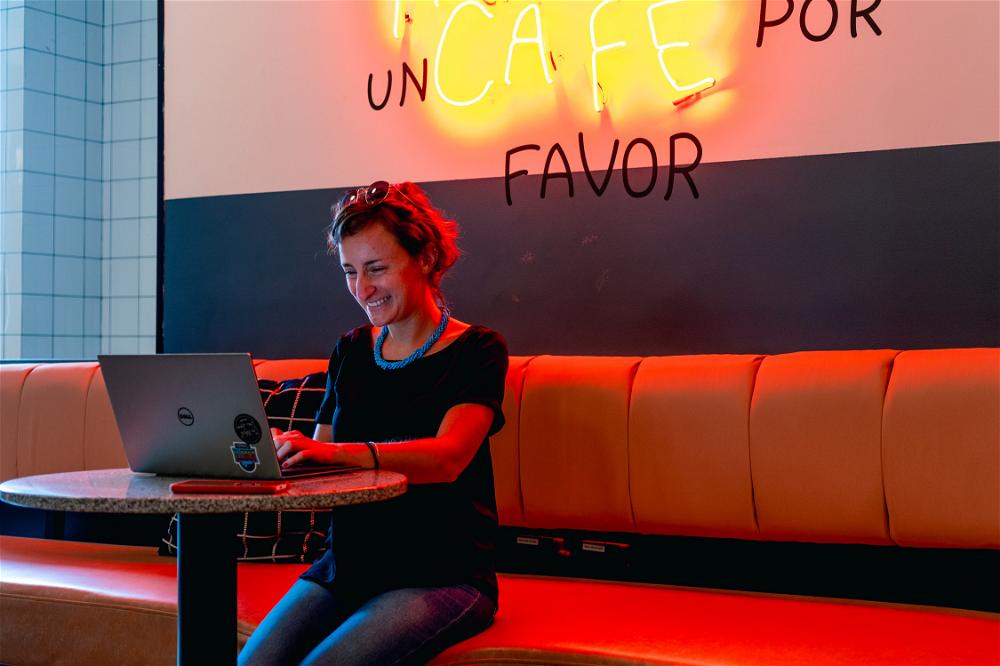The Benefits of Coworking Spaces for Remote Workers in 2025

Discover the benefits of coworking spaces for remote workers: networking opportunities, increased productivity, cost savings and community support. Learn why coworking spaces are worth it in 2025.
This article may contain affiliate links. We earn a small commission when you purchase via those links — at no extra cost to you. It's only us (Becca & Dan) working on this website, so we value your support! Read our privacy policy and learn more about us.
Table of contents
- What are coworking spaces?
- Why coworking works
- Benefits of coworking spaces
- Serving as a place that’s more inspiring than a traditional office
- Being open 24/7 (or late into the night)
- Activities and networking events
- Creating the possibility of working remotely and traveling
- Helping make freelancing careers work
- Encouraging entrepreneurship
- Ability to use one membership in multiple cities
- Access to a community manager who can help curate the experience
- A variety of environments to work in within a single coworking space
- Reducing anxiety and loneliness for remote workers
- Giving stability and routine to digital nomads
- Coworking vs Working from Home
- So, are coworking spaces worth it?
The benefits of coworking spaces include networking opportunities with diverse professionals, increased productivity through dedicated workspace, cost savings without long-term leases, community support that reduces isolation and flexible access to professional amenities.
These shared workspaces help remote workers and digital nomads maintain routine, build connections and access reliable WiFi and meeting rooms without the overhead of a private office.
Coworking spaces are one of the best alternatives to working from home, if you have access to one. They’re also a great way to retain a sense of routine and stability while traveling, if you’re working remotely in another city or another country.
The fact about coworking spaces is that you can work in them as a traveling digital nomad or as a permanent full-time employee in a company that has rented out a private office space in a coworking space. Both situations allow professionals to benefit from all the advantages of these unique work environments that foster creativity and entrepreneurship.
Here are all the benefits of coworking spaces that I can think of, based on my experiences in quite a few.
What are coworking spaces?
If you’re new to the concept, check out our complete guide to what is a coworking space for a full breakdown. But here’s the quick version: coworking spaces are office environments where remote workers can go to work, instead of working from a traditional company office.
Coworking spaces might have “hot desks” and private offices. Some even have rooms that function as private spaces for several employees of a company or organization.
Coworking spaces offer a set of benefits, like community-building events, creative spaces, thoughtfully-designed aspects and typically, a community manager who pieces the social components together. Coworking spaces might be in cities or in vacation destinations. Read on to learn about the benefits of these locations for remote work.

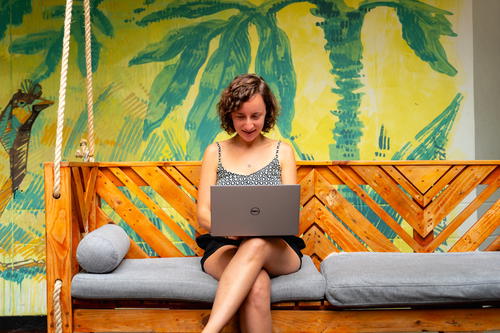
Why coworking works
Before diving into the specific benefits, let me explain why coworking spaces work so well for remote professionals.
I always look for a coworking space when I work remotely. When I’m traveling and can’t find one, I’ll settle for the next best thing. This might be a cafe with good WiFi or a hotel lobby with a decent workspace.
Anything to feel that connection of being in an active workplace, even when I’m not in a dedicated coworking space. It beats working in isolation in an unfamiliar place, hands down.
We’ll cover more about this in the benefits, but the reason coworking “works” (at least for me) is that you generally feel the sense of community and feel like you’re a part of something, even when you’re mostly focused on your computer screen.
Benefits of coworking spaces
When you work in a coworking space, you’re not only renting a desk. You’re joining a community and accessing a whole ecosystem of benefits that can transform your remote work experience.
Ability to meet other interesting professionals (social aspect)
Unlike a group of employees who work in an office, in the traditional sense, a coworking space is the professional home for people who have all sorts of jobs and talents.
Before I left home to travel and work remotely, I had never worked in the same room as web developers, graphic artists, software salespeople and e-commerce specialists.
Coworking spaces introduced me to so many types of professions I didn’t even know existed, and to the types of people who have these professions. Just being around the buzz of people coding websites, writing novels and designing startups was far from the corporate talk and dry meetings I’d known to be an integral part of ‘professional life.’ It was awe-inspiring.


Serving as a place that’s more inspiring than a traditional office
Have you ever done work with your laptop while in a human-sized net? On a deck? In a cubby?
All in one day, while coworking at a space in Medellin, Colombia, I did two of these three things (can you guess which?) and there are many other types of creative designs with which coworking spaces have been planned.
Sometimes switching your surroundings is the best inspiration of all, which is why the best coworking spaces have been designed with meditation rooms, outdoor deck space, social kitchens, high-top tables, couches, zip lines… you name it.
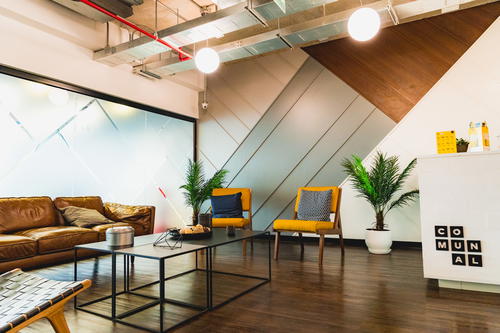
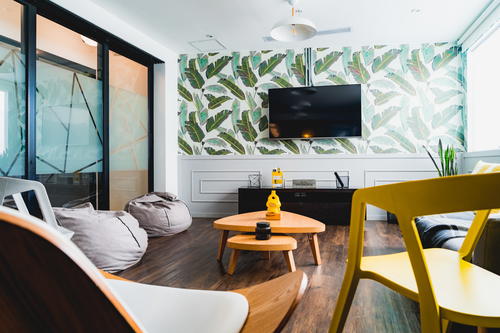

Being open 24/7 (or late into the night)
While not all coworking spaces are open 24/7, you can usually find one that is, in some of the best cities for working remotely.
That makes it easy in case you need to work late, come in early or take a call on the weekend. You might not even be alone, when working on an urgent deadline or packing in some work on a Sunday in order to get ahead for the week.
In Merida, Mexico, we got a coworking space membership at Conexion 60 that got us 24/7 access to our coworking space, in case we needed it.
It would’ve been useful if we had wanted to go in there on a rainy weekend, like if we had nothing else to do (and the internet in Airbnbs has the potential to be spotty).
We recommend remembering that working TOO much is one of the biggest mistakes to avoid when you work remotely, so keep that in mind — a healthy work-life balance is key!


Activities and networking events
At Comunal Coworking in Lima, Peru, I attended a weekly event called Spanglish, where English-speaking professionals have the opportunity to link up with Spanish speakers and answer get-to-know-you questions in the form of a language exchange.
Not only was it fun, but I walked away with some new colloquial Spanish knowledge and some new people to say hi to in the workspace for the next few weeks.
Check out our list of ways to network socially as a digital nomad to see a bit more in-depth about our experience networking while traveling abroad to work remotely.
At our coworking space in Medellin, there were yoga classes and meditation sessions. At WeWork La 93 in Bogota, my partner Dan and I even hosted a community event to discuss photography, social media and business for anyone who wanted to attend.
Events like these give a sense of community to places that are centered around “work,” and they’re great bonuses — and usually more interesting — than a typical post-work happy hour with coworkers at the same bar time after time.
Still seeking more ways to network and create social connection when you work remotely? Look outside the coworking space as well, to our list of ways to network when you work remotely, so that you can always be ‘meeting’ new people through social and professional outlets.
Creating the possibility of working remotely and traveling
If you want to figure out how to work remotely and travel, coworking abroad may be an option or a solution, for you.
Check our a program like Remote Year to help set you up with travel accommodations and coworking. Dan and I have both been on a program and we have nothing but great things to say!
In Medellin, Colombia, I met a bunch of digital nomad professionals who had been traveling anywhere from months to years, mostly alone. They would seek cool coworking spaces wherever they went, in order to have consistent WiFi, a guaranteed spot at a workspace setup and the familiarity of seeing familiar faces day after day.
This is how coworking spaces are a more consistent solution to working remotely and traveling than doing work from coffee shops and restaurants or hostel lobbies. Remember to bring along what you need for a remote work setup, by using our digital nomad packing list.

Helping make freelancing careers work
The digital revolution, the rise of remote work and all the factors that have made creative careers possible have given many people the opportunity to start their own businesses and begin freelancing.
Freelancing only became possible for me once I became in-tune with the remote work lifestyle and the belief that work can take place anywhere.
This drift from the traditional full-time office job has naturally allowed for coworking spaces to be places where freelancers can feel like they fit in perfectly. In fact, there’s no better place to be a freelancer than at a coworking space — where else would you find community, while meeting individuals so similar as well?
It’s no surprise that coworking spaces and ‘digital slowmading’ for freelancers have made it to our list of the top trends in the future of remote work this year!
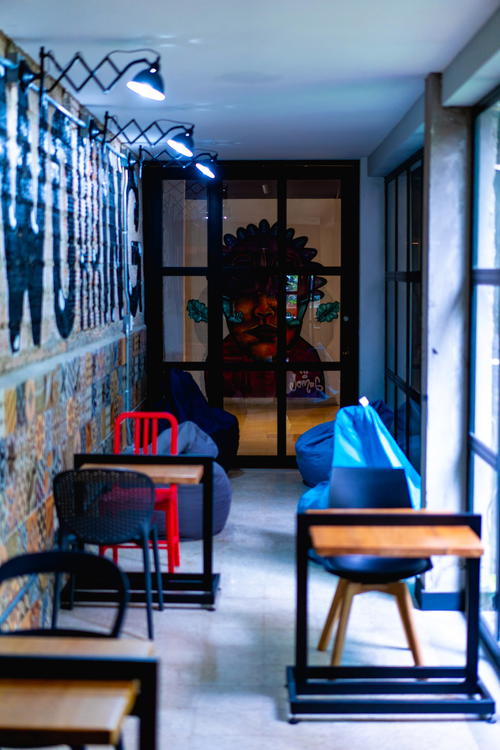

Encouraging entrepreneurship
As I mentioned above, coworking spaces are for those who work remotely already or any group of employees working for a small company that has sought office space at a coworking space.
Coworking spaces (due to being a relatively new phenomenon) are usually somewhat newly-built and therefore have incorporated creative and modern designs into their builds.
Entrepreneurship, because it can be so outside-the-box, requires a certain level of inspirational environment as well. Whether you and your team are a total three people or fifteen, being in a coworking space and using all its dynamic locations and benefits will likely inspire new ideas.

Ability to use one membership in multiple cities
As coworking spaces rise in popularity along with the increase in professionals who work remotely, coworking spaces that have multiple locations bring a great benefit.
If you’ve read this far into the article, you’ve probably heard of WeWork, one of the most global coworking space brands. Dan and I have worked from WeWorks in Colombia and the US. More on the ‘digital nomad’ side of coworking spaces are the coworking spaces at “coliving” houses or buildings, which make for a convenient experience abroad if you’re nomad-ing.
Check out our list of the best cities for working remotely, which were rated by us on the availability of coworking spaces.
Access to a community manager who can help curate the experience
A coworking space community manager is typically a person whose job is to make sure that your coworking experience is excellent.
This person will typically send community newsletters that detail new members or new companies joining the space, upcoming events and opportunities to give feedback about what you’d like to see.
Depending on the size of the coworking space, there may be several community managers who manage a single floor out of many. Typically it’s a great idea to become friendly with the community manager so that you can make sure you’ll be getting the most out of your coworking space membership.
A variety of environments to work in within a single coworking space
In a traditional office, if you’re not at your desk, your coworkers may wonder where you are. Or, their assumptions could jump to the fact that you are slacking off.
Worse yet, they could think you left for the day, if they don’t notice that you’re indeed online. There are so many misconceptions that can occur when people take ‘being at your desk’ very literally.
At a coworking space, the ‘desk’ has a new meaning.
Your desk can be wherever you feel comfortable, whether it’s outside at an outdoor table under an umbrella or sitting at the bar in the social area near the cold brew coffee.
This is one of my favorite parts about a coworking space, personally.
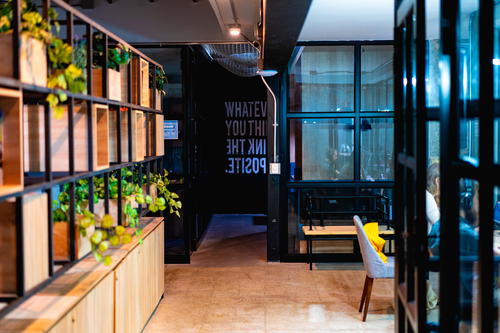

Reducing anxiety and loneliness for remote workers
For remote workers or people who’ve started working from home, figuring out how to avoid burnout and isolation are real concerns.
Anxiety and solitude often stem from feeling isolated while working from home or working alone without any company.
Coworking spaces help solve these issues by providing a constant social (or, as social as you choose to be) atmosphere, where you’ll see other humans and you can continue to meet people and make meaningful connections.
Still looking for more meaningful ways to stay connected while working remotely? Don’t miss our list of ways to stay connected virtually, even when you’re working remotely and traveling.
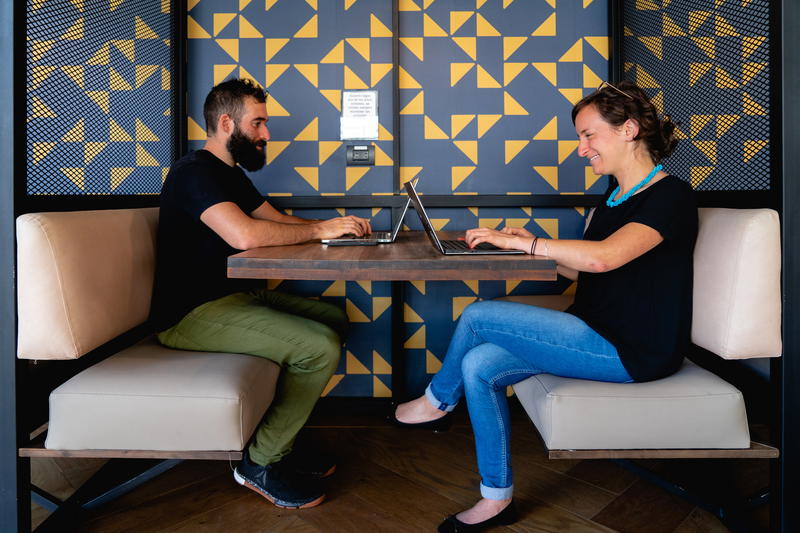
While coworking spaces are not the answer for everyone, especially if you don’t live very close to one and would need to commute, they do solve the problem of feeling alone while working remotely.
This is one of the greatest benefits of coworking spaces by far.
Giving stability and routine to digital nomads
Being a digital nomad can be overwhelming — the freedom to make your own remote work schedule, work in different time zones and figure out how to balance productivity and motivation.
One of the biggest struggles of becoming a digital nomad, for me, was sticking to a schedule and making weekdays feel like weekdays, and weekends feel like weekends, before I had a coworking space to go to.
Going to a coworking space brings back the feeling of going to an office, but it’s an office — rather, a work environment — that you choose, if you’re a freelancer, entrepreneur or digital nomad on the road.

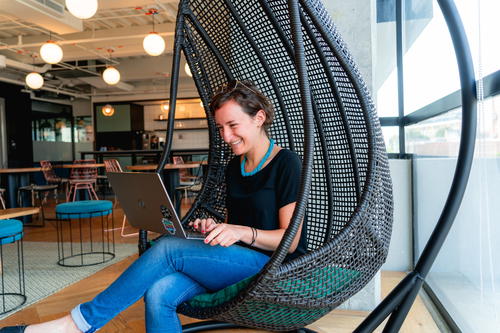
Going to the same coworking space day after day creates more of a sense of belonging and routine than going to a cafe that might be closed some days, or may have no more available seats or outlets, at the time you show up for sitting down at your favorite table.
Going to a coworking space is more social than working from home. It’s easier to focus at a coworking space than at home because you can’t slack off and start cleaning.
It’s also easier to be productive and stay motivated at a coworking space where you see lots of people working, compared with a cafe, where there may be some kids running around distracting you, or a cute puppy or the rattling sound of an espresso machine interrupting a call you had to take (I’ve been there!).
Coworking vs Working from Home
When deciding between a coworking space and working from home (if if you’re traveling, a hotel room), it helps to see the differences side by side. Here’s a comparison that breaks down the key factors:
| Feature | Coworking Space | Working from Home |
|---|---|---|
| Cost | Monthly membership ($100-$500+) | Free (but you pay for utilities, internet) |
| Social Interaction | Daily face-to-face connections | Limited to video calls and messages |
| Distractions | Minimal (professional environment) | High (household tasks, family, pets) |
| Networking | Built-in community and events | Requires extra effort to find |
| Productivity | Higher (dedicated workspace) | Varies (depends on home setup) |
| Flexibility | Set hours (but 24/7 access available) | Complete schedule freedom |
| Amenities | WiFi, meeting rooms, printing, coffee | You provide everything |
| Commute | Required (unless you live nearby) | Zero commute time |
| Work-Life Separation | Clear boundary (leave work at the space) | Blurred lines (work and life mix) |
| Professional Image | Meeting rooms for client calls | Video calls from your bedroom |
The best choice depends on your personality, work style and living situation. If you struggle with isolation, need better work-life boundaries or want more networking opportunities, a coworking space is likely worth the investment. If you’re highly self-motivated, have a dedicated home office and prefer complete flexibility, working from home might be the better fit.
Many remote workers find that a hybrid approach works best: working from home a few days a week and using a coworking space for the rest. This gives you the benefits of both worlds without committing fully to either option.
So, are coworking spaces worth it?
Overall, coworking spaces are like flexible, social and motivational workspaces that get the job done. The rise of coworking spaces has solved many problems for remote-first professionals and traveling remote workers, from forming communities to creating routine and stability.
To see more about how coworking spaces fit into working remotely and traveling, visit our guide to the best tips that will help you bring your remote job on the road. And if you’re still learning the basics, make sure to check out our complete guide to what is a coworking space for everything you need to know.
💻 Leveling up your remote work setup?
We built these resources from years of laptop life on the road. If our remote work tips gave you a boost, a coffee helps us keep testing tools and ideas.
Support our remote work guidesYou may also like
-
![A group of people taking pictures on a rooftop.]()
How to Work from Anywhere with Remote Year
What is Remote Year? It's a work and travel program for people who can work remotely and want to travel the world. Find out how to work remotely and travel with a group.
-
![]()
What is a coworking space? We define the meaning of coworking spaces, how they work, what they offer, and why they are great for remote workers in 2025.
-
![]()
How to Work Remotely and Travel (19 Expert Tips)
Is working remotely and traveling easy? There are several challenges that come from being away from home! Here are my tips for working remotely while traveling.
-
![A woman standing on a street in a city.]()
What to Expect as a Digital Nomad in Lima
Choosing Lima, Peru, as a digital nomad destination is a great choice. Here's what it was like to start working remotely there.
-
![]()
How to Get Paid to Travel the World: 32 Money Making Ideas
Discover 32 ways to get paid to travel in 2025. From remote work and teaching abroad to content creation and travel jobs with no experience required. Real examples from travelers who make money while exploring the world.
-
![]()
How to Choose Remote Work Destinations (What to Consider)
A lot went into my decisions of where I should work remotely and travel as a digital nomad. In this list, see which factors were most important to me, and why.
-
![]()
Digital Nomad Life: How to Make Friends and Stay Social (12 Ways)
Making friends and having a social life as a digital nomad doesn’t have to be hard! Here are a few cool ways I met new people when I lived abroad.
-
![]()
What to Pack for Working Remotely and Traveling (Packing List)
Looking for a packing list for working remotely while traveling? Here are the travel-sized must-haves for having a digital nomad laptop work setup when you’re on a trip.
-
![A group of people taking pictures on a rooftop.]()
How to Work from Anywhere with Remote Year
What is Remote Year? It's a work and travel program for people who can work remotely and want to travel the world. Find out how to work remotely and travel with a group.
-
![]()
Roost Laptop Stand Review: Thoughts After 5+ Years of Use
Do you need a Roost laptop stand? Is the Roost laptop worth it? Here’s why the Roost laptop stand is the best laptop stand for working remotely or working from a home office.

